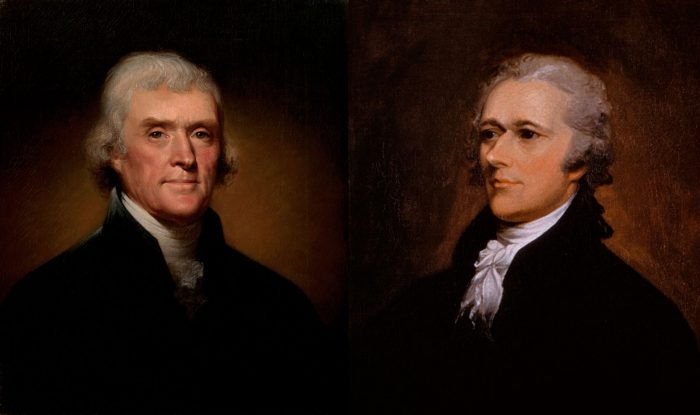In the 1790’s the Republicans, led by Thomas Jefferson, and the Federalists, led by Alexander Hamilton were the first political parties in the Western world.
Unlike loose political groupings in the British House of Commons or in the American colonies before the Revolution, both had reasonably consistent and principled platforms, relatively stable popular followings, and continuing organizations.
Their conflict was about the nature of the federal government. Should the central government be dominant or the state’s government. This are their basic views:
Federalism
Hamilton and the federalists believed in a strong central government.
Jefferson and the republicans believed in states rights and a limited central government.
Fears
Hamilton and the federalists feared anarchy.
Jefferson and the republicans feared tyrannical government.
Constitution
Hamilton and the federalists believed in loose, elastic interpretable construction of the constitution that errs on the side of giving powers to the central government.
Jefferson and the republicans believed in a strict construction of the constitution where the constitution expressly enumerated all the powers belonging to the federal government and reserved all other powers to the states.
Support base
Hamilton and the federalists support base was urban.
Jefferson and the republicans support base was rural.
Government involvement in economy
Hamilton and the federalists believed that the government SHOULD be involved in the economy to help with economic development, the central government will be the hand ruling the economy.
Jefferson and the republicans believed that the government SHOULD NOT be involved in the economy (laissez Faire) they believed in Adam Smith’s invisible hand ruling the economy.
National Bank
Hamilton and the federalists: YES
Jefferson and the republicans: NO
Tariffs
Hamilton and the federalists believed in tariffs to protect local manufacturers.
Jefferson and the republicans believed in eliminating tariffs to get cheaper goods.
Federal assumption of state war debts.
Hamilton and the federalists believed in centralizing the debt.
Jefferson and the republicans believed in keeping the debt separated since some states had already paid theirs (Virginia, etc…)
Foreign policy
Hamilton and the federalists were anglophiles.
Jefferson and the republicans were francophiles (supported french revolution).
